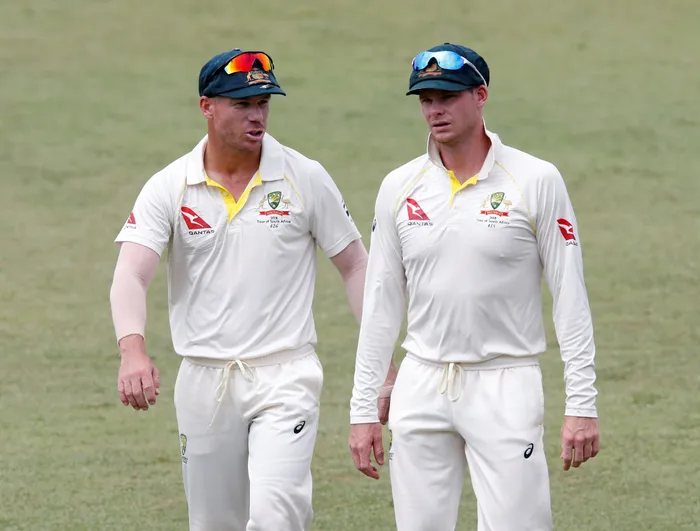
Australia's David Warner and Steve Smith leave the pitch after winning the first Test against South Africa during the ball-tampering tainted series earlier this year. Photo: REUTERS/Rogan Ward Australia's David Warner and Steve Smith leave the pitch after winning the first Test against South Africa during the ball-tampering tainted series in 2018r. Photo: REUTERS
Image: Reuters
With the cricketing world getting over Kagiso Rabada’s recent “recreational drug” usage scandal, KG was seemingly let off the hook with a slap on the wrist, which was warranted given the merit of the situation.
But there have been, however, a good few cricketers over the years who have found themselves deep in controversy.
Here are seven of crickets most controversial players:
Starting out Down Under, as one could guess, the Australian cricketing outfit has always been a frontrunner in the sport but the flip side to that coin has been marred by controversy.
Sandpaper Gate, as the saga came to be known, saw Warner emerge as a central figure or the “architect”, according to Cricket Australia’s investigation.
On March 24, 2018, Australia and South Africa played each other in Cape Town. During the game, Cameron Bancroft was caught on camera using a small piece of yellow sandpaper to rough up one side of the ball, a tactic aimed at generating reverse swing illegally.
Warner had instructed Bancroft on the method of using the sandpaper on the ball to acquire extra swing. Warner was disciplined for misleading Bancroft as a senior player on the team.
Smith, who was captain of the team, was fully aware of what Warner’s tactics entailed but did nothing to stop him nor Bancroft from altering the ball.
Warner received a 12-month ban from international and domestic cricket and a lifetime ban from leadership roles in Australian cricket. Smith received the same playing ban but only a 2-year leadership ban. Bancroft was banned for a month.
Smith’s reputation improved after his return to cricket, but Warner’s public figure shattered and did not quite come back together. While the Australian is adored for his aggressive batting skills, Sandpaper Gate always seems to follow him around.
Regarded as one of the most damaging match fixing scandals in cricket history, the 2010 Pakistan scandal put a stain on the country’s cricketing reputation that some would say is still being scrubbed off to this day.
It involved two senior and highly talented players and one teenager with a bright cricketing future.
The scandal, which took place during Pakistan’s tour of England, resulted in ICC bans and criminal convictions.
Mazher Mahmood, who worked as a journalist for a British tabloid named News of the World, went undercover and posed as a bookmaker.
Mahmood dealt with Pakistani player agent Mazhar Majeed. He paid Majeed £150,000 to orchestrate specific no-balls during the match.
Asif, Amir and Butt were convicted of conspiracy to cheat at gambling and conspiracy to accept corrupt payments.
Asif served six months of his 12-month prison sentence in a UK prison and received a seven-year ICC ban.
Amir served three months of his six-month-sentence and received a five-year-ban.
Butt served seven months of a 30-month-sentence and was slapped with a 10-year-ban, five years were suspended. Majeed, their agent, served 32 months in prison.
It was the first time players were jailed for on-field offences.
To have your level of celebrity be compared to Nelson Mandela is a huge ask for anyone, let alone an athlete.
But Hanse Cronje was South Africa’s shining light on the world cricketing stage. A humble school boy with a dream that made it to the top of the food chain. Tactical, charismatic and confident, Cronjè had all the makings for greatness.
But at the turn of the century, Cronjè received a lifetime ban from the game and later died after a plane he was travelling in crashed.
Delhi Police announced they had intercepted phone calls between Cronje and an Indian bookmaker, Sanjay Chawla. Police revealed that Cronje had accepted money to influence match outcomes and offer inside information during South Africa's ODI series in India.
Cronjè initially denied the allegations but later admitted and named a few other players during his testimony on the scandal. He admitted to receiving over $100,000 from bookmakers, passing on team information and offering teammates money.
The infamous testimony was a defining moment in South African cricketing history, especially for his fans after watching the match-winning captain walk out of the King Commission of Inquiry in Cape Town sobbing.
Hansie said his actions during the Indian tour were motivated by greed and regretted his decisions.
Now seen as a paradise for cricketers, with top earning potential and international recognition, the Indian Premier League or IPL has developed itself as one of the world’s premier cricketing events where stars are born and some go to die.
In 2013, the IPL was rocked by the Sreesanth match fixing scandal, which led to his ban. What made matters worse, Sreesanth was India’s gloried fast bowler that was a part of their 2007 T20 and 2011 World Cup-winning teams.
Police were surveilling phones of underworld figures linked to illegal betting. They uncovered conversations suggesting Sreesanth and others were agreeing to bowl pre-determined no-balls or concede a specific number of runs.
The bookies allegedly signaled when to bowl a fixed over by using hand gestures or towel signals. Sreesanth was caught on camera using a towel as a signal before bowling a pre-fixed over.
He was arrested by Delhi police while playing for the Rajasthan Royals after he was allegedly paid ₹10 lakh (approx. $18,000 at the time) to concede 14+ runs in an over against Kings XI Punjab on May 9, 2013.